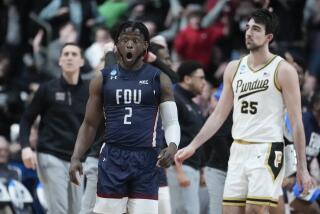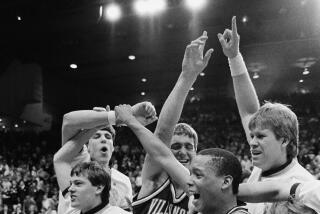Critics Seek Reasons for DePaul Collapse
- Share via
CHICAGO — Has the Hoya jinx done it again?
That is one of the many theories that are being tossed about to the latest collapse of the DePaul basketball team. It probably holds about as much water as it did one year ago but it is nonetheless one of the reasons being given as to why the Blue Demons are off to a disappointing start this year.
Last year, DePaul was unbeaten and ranked No. 2 in the nation heading into a nationally televised showdown with Georgetown. The Hoyas blew away the Blue Demons, who tumbled for the rest of the year and wound up being eliminated in the first round of the NCAA by Syracuse.
This year, DePaul was again highly ranked when it hosted Georgetown in a nationally televised game. The Hoyas handed the Blue Demons what was then the worst homecourt defeat they had ever suffered.
DePaul went on to get bombed at Purdue, upset by Navy, barely beat Texas, was trounced by Notre Dame and embarrassed by Cleveland State.
Normally rabid DePaul fans could be heard booing at the Rosemont Horizon where DePaul had the best homecourt record in NCAA Division I entering this year.
At the rate DePaul is going, it may be able to avoid the usual first-round disappointments of the NCAA of previous years because the Blue Demons may not even qualify for the 64-team field.
“It’s been difficult but we’re not hanging our heads,” says DePaul second-year coach Joey Meyer. “I really don’t have a lot of answers why we played so well against a team like Houston on the road and then have problems in the next game.”
The Georgetown theory is only one of several that can explain why a program that was at its zenith only a short time ago has gotten into so much difficulty winning basketball games.
Here are some others:
--Inferior players. Despite constantly good recruiting, some of DePaul’s veterans have not progressed since their freshmen year. Some scouts suggest Dallas Comegys, Kevin Holmes and Tony Jackson were actually better their first year than they are as upperclassmen.
--Inferior coaching. Some grumbling DePaul alumni suggest Coach Joey Meyer isn’t as good a bench coach as his father, Ray, and is losing games on the sidelines he should be winning. They also point to Ray getting close calls from officials while Joey is not.
--Tough scheduling. After years of a soft schedule, DePaul went big time in the Mark Aguirre-Terry Cummings’ era and placed too many difficult opponents on its schedule. When the team didn’t beat up on the national powers such as Georgetown, it became ripe for upsets at the hands of lesser lights. Teams like Biscayne and Maine were replaced by St. John’s, Louisville and Georgia Tech. Additionally, some of the weaker teams of the past have risen to the top like Alabama-Birmingham.
--Too much publicity. An offshoot of the tough scheduling theory, DePaul’s fish bowl existence with so many nationally televised and cablecast games has made the players too concerned with individual achievements rather than team goals. It also has made DePaul a prime target for other less publicized schools which view a win over the Blue Demons as a chance to vault into the national limelight.
The DePaul problems may be a combination of all the factors. DePaul has been overrated since Aguirre and Cummings departed for the pros and hasn’t been able to live up to its high national profile. The transition from Ray to Joey Meyer was also probably more difficult than many people expected.
The DePaul talent hasn’t developed as hoped, which can happen to any program, and playing against an upgraded schedule hasn’t allowed the Demons too many patsies to overcome inherent weaknesses.
The publicity factor, while good for the school’s coffers, has probably magnified the weaknesses of the program.
DePaul can still salvage its 1985-86 season and could even turn into a team like Villanova like last season. But qualifying as an independent means there is no conference tournament to make amends for a disappointing regular season and also means it will be more difficult to catch the eye of the NCAA tournament committee next month.
More to Read
Go beyond the scoreboard
Get the latest on L.A.'s teams in the daily Sports Report newsletter.
You may occasionally receive promotional content from the Los Angeles Times.










